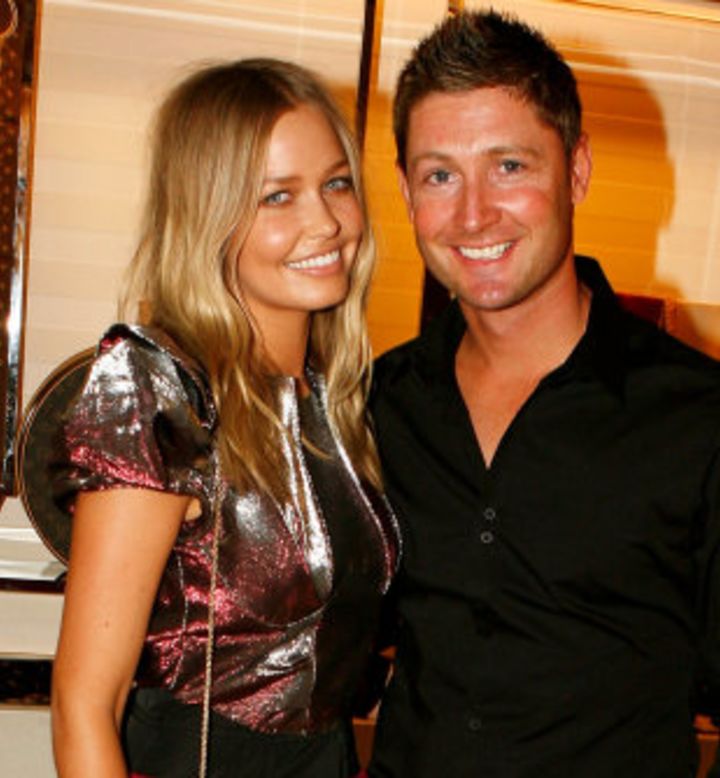Behind every successful captain ...
... is a stable administration and a supportive family. Michael Clarke, the Australian selectors and the Pakistan board would do well to note that

It's been a tumultuous week for international cricket captains, past, present and even in-waiting. Three Pakistan captains - in their case it's difficult to distinguish the blurred line between the incumbent and those who have recently been demoted - have either been suspended or heavily fined. Then Australian captain in-waiting, Michael Clarke, abandoned the tour of New Zealand to return home in an attempt to sort out his private life.
First, the Clarke situation. It's very difficult and generally fraught with danger to pass opinion in affairs of the heart. However, Clarke's move, while it was the correct one for his own peace of mind, will have given the Australian selectors some reason for concern.
There are a number of factors that go into deciding who should captain an international cricket team. In the case of Australia, stability and continuity are priorities that, while not at the top of the list, are weighty factors. Hence one of the more remarkable statistics in the international game: in 133 years of Test cricket Australia has only appointed 42 captains, and at least eight of those were stand-in skippers. It's a job-security record rarely seen in modern times, and testament to the method of choosing a suitable candidate on the basis of form and fitness.
There's no doubt Clarke qualifies for the job on his batting form and tactical nous, as displayed in the one-day internationals and Twenty20 games where he has been a successful captain. Nevertheless, his long-term captaincy aspirations already feature a question mark because of a dodgy back. It's an unfortunate quirk of fate to be born with such a degenerative condition but it's unwise to add to the selectors' concerns by having an unstable relationship that generates more publicity than a Hollywood marriage.
Clarke has now moved to rectify this situation and, wisely, will return to the team for the first Test against New Zealand. Hopefully, he's now in a state where he can concentrate on his cricket and let the captaincy situation take care of itself.
Over the years players who have craved the Australian captaincy have generally been inferior natural leaders to those who have come upon the job by way of natural progression or unusual circumstances.
Currently Clarke is the best candidate to inherit the Test captaincy and he's now at the right age to take on the role. In addition, there's a paucity of long-term candidates waiting in the wings, but Clarke's tumultuous relationship could well have made the selectors nervous enough to buck tradition and consider opting for a short-term captain, like Simon Katich or Cameron White.
And on the subject of tumultuous, the Pakistan captaincy would rank alongside the Richard Burton-Elizabeth Taylor relationship.
Prior to the 1992 World Cup final I described the eventually successful Pakistan side as a skilled rabble. These days there's a lot less of the skill and considerably more of the rabble.
On the subject of tumultuous, the Pakistan captaincy would rank alongside the Richard Burton-Elizabeth Taylor relationship
There's no doubt Pakistan cricket needed a shake-up. A good, honest appraisal of what has happened and where they are headed was long overdue. However, it would have been preferable if the accountability process had also included the officials.
The suspension and fining of a number of Pakistan players, including three former captains, is shrouded in mystery. The lack of transparency in the process and the findings has only added to the impression of a muddle-headed administration. The failure to outline reasons for the suspensions and fines will only lead to more conjecture. If the administration had hoped to quell rumours of performance-fixing, which shadow the Pakistan team like a faithful hound, then all they have succeeded in doing is increase the volume of the baying.
The best thing for Pakistan cricket could well be a clean-out, which will necessitate a dip in fortunes for the time being, followed - if done sensibly - by a prolonged spell of success. However, the clean-out should also include officials, otherwise the same erratic play and behaviour on the field will continue.
Only one person can run a team successfully and that's a strong-minded and clear-thinking captain. However, behind every successful captain is a stable administration and a supportive family.
Former Australia captain Ian Chappell is now a cricket commentator and columnist
Read in App
Elevate your reading experience on ESPNcricinfo App.